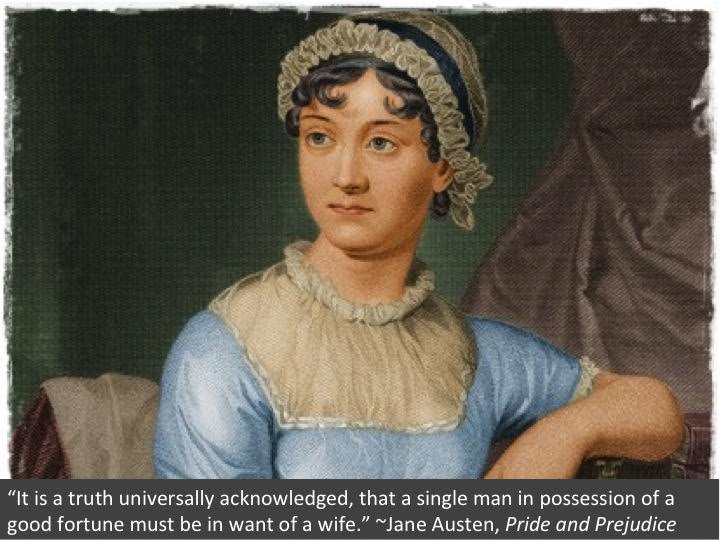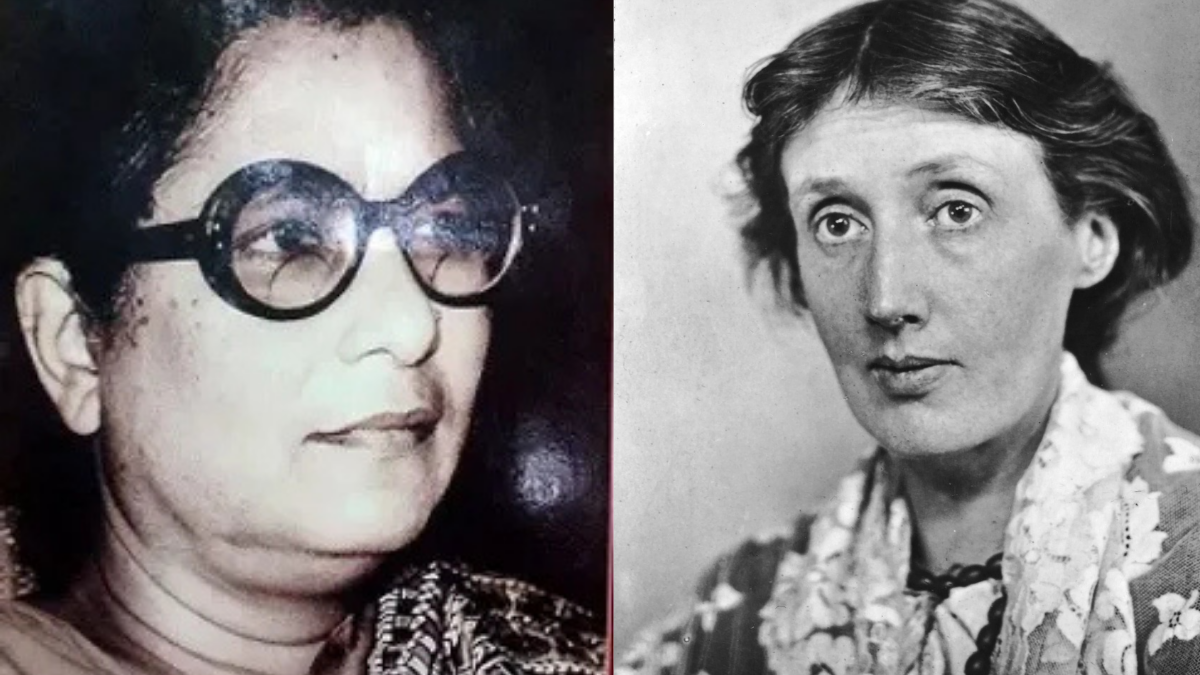It is a truth perhaps not so universally acknowledged that feminist writers have a rather difficult relationship with Jane Austen. We love her biting social commentary and her sense of irony; we’re awed by her satirical wit and sparse prose and of course, we enjoy her romantic intrigues.
But we’re troubled by her unbending morality, her preoccupation with marriage, her tendency to reward well-behaved women with upward social mobility and punish rebellious ones with uncertain futures (the exceptions being the impetuous Marianne Dashwood who marries the ever faithful – and wealthy – Colonel Brandon and her sensible sister Elinor who makes a less lucrative but happy marriage with Edward). The limited information we have on Austen’s life (thank you, Cassandra Austen, for burning most of your sister’s letters) has resulted in endless though ultimately unsatisfactory speculation on her possible feminism.
For every admirer who argues vociferously that Jane Austen was a feminist writing about love and marriage with her tongue in her cheek, there are others who claim with equal fervour that she was firmly located in the (patriarchal) conventions of her time. So on the eve of her 242nd birth anniversary (16th December), rather than ask if Austen was a feminist, perhaps it would be more fun to explore five feminist moments in her novels.
Mansfield Park
When Fanny Price refuses to marry a man she doesn’t respect.
“I am so perfectly convinced that I could never make him happy and that I should be miserable myself.”
Prudish, self-sacrificing and diffident, Fanny Price is possibly the most difficult of Austen’s heroines to like. She creeps about Mansfield Park ready to do everyone’s bidding, never asking anything for herself, submitting herself to fate. Yet when her uncle and benefactor, Sir Thomas, instructs her to marry the elegant and eligible Henry Crawford she finds the courage to refuse.
Having watched the charming and flirtatious Henry toy with the affections of both Sir Thomas’s daughters, Fanny disapproves of his principles and suspects his motives. Her decision is not an easy one as Henry, for all his faults, seems to sincerely admire Fanny and offers her financial stability and social status, not to mention a chance to upstage her condescending cousins.
But Fanny stands firm despite the remonstrations of the authoritarian Sir Thomas who point out that as the eldest daughter of an impoverished family she is unlikely to receive a better offer. In a world where women had few options for financial security, Fanny’s unbending resolve is impressive. “We all have a better guide in ourselves if we would attend to it,” she asserts, “than any other person can be.”
Persuasion
When Sophie Croft calls out her brother’s misplaced notion of chivalry.
“I hate to see you speak as if women were all fine ladies instead of rational creatures.”
When the handsome and dashing Captain Wentworth makes an impassioned speech against the naval practice of allowing officers’ wives to travel onboard ship with their husbands, his sister denounces his sexism, claiming that any reasonable woman may be just as happy on the sea as on land. A naval wife herself, she goes on to describe her travels to ‘the East Indies’ and her four Atlantic voyages.
Captain Wentworth is probably trying to impress the pretty Miss Musgroves with his misguided “gallantry”, as he calls it, by suggesting that women are much better off staying safely at home (probably sewing samplers and pining for his return) but Sophie opposes this foolish idea by commenting that, “We none of us want to be in smooth water all our days.”
Also Read: Virginia Woolf And Her Plea For A Room Of One’s Own
Emma
When Jane Fairfax breaks off a relationship that’s going nowhere to become a governess.
“I am not at all afraid of being long unemployed.”
The beautiful and talented Jane Fairfax’s life is not easy. She has little income, no prospects and a drab home with her aunt. Moreover, she is in love with the irresponsible Frank Churchill whose financial dependence on his aunt requires him to keep their engagement a secret. Her immature lover goes on to make her miserable, openly flirting with another woman and spreading frivolous gossip about Jane with the ostensible purpose of hiding his feelings for her in public.
But Jane is too self-respecting to put up with Frank’s behaviour for long. She breaks off the engagement and makes arrangements to take up a teaching position, preferring the rather dull life of a governess to an uncertain relationship with a spineless man. And with her intelligence and musical talents, she soon finds lucrative employment. Given Austen’s penchant for happy endings, Jane and her somewhat reformed lover are reunited, but not before she shows him that she is more than capable of taking control of her life despite the emotional costs involved.
Northanger Abbey
When unsophisticated Catherine Morland presages an entire subdiscipline of history in her conversation with Henry Tilney.
“Real solemn history, I cannot be interested in. The quarrels of popes and kings, with wars or pestilences…the men all so good for nothing, and hardly any women at all.”
As many twentieth-century feminists have argued, textual history is largely preoccupied with the experiences of powerful men, silencing the voices of women and marginalised groups. But long before subaltern and feminist histories began to emerge, Austen makes a telling comment on malestream history though Catherine’s innocent remarks.
Catherine suggests that a lot of historical accounts must be invented (or at least exaggerated) to make the central (male) characters look good. In a lively discussion that follows she amuses Henry by commenting that (academic) history seems to be written as if its sole purpose is to torment young students: a plea for more emotive and transparent accounts which engage the lay reader.
Persuasion again
When Anne Elliot helps Captain Harville understand why heartbreak is harder for women than for men, despite what popular literature suggests.
“Men have had every advantage of us in telling their own story. Education has been theirs in so much higher a degree… I will not allow books to prove anything.”
Saddened by how quickly his late sister’s fiancé replaces her with another woman, Captain Harville confides in Anne who suggests that men tend to move on from heartbreak more quickly than women. When Harville protests that literature suggests otherwise Anne refuses to accept his claim, arguing that most novels and poems of their time are written by men. Harville and Anne discuss with impressive frankness the pain of separation, the fear of never seeing a loved one again and the grief that follows the bereavement.
Anne reasons that it is women’s “fate rather than our merit” to be always confined at home where “our feelings prey upon us” without the active professional lives that allow men to overcome their losses. The conversation ends with one of the most poignant lines Austen ever wrote. “The only privilege I claim for my own sex (it is not a very enviable one, you need not covet it),” says Anne, “is that of loving longest when existence and when hope is gone.”
It is with this comment on women’s susceptibility to grief, which is attributed not to some mythical “feminine sensibility”, but simply to women’s confinement within domesticity and their limited avenues for self-expression that Jane Austen comes closest to a feminist perspective on the gendered norms of her time.
Also Read: The Madwoman In The Attic: How “Mad” Was Bertha Mason In Jane Eyre?
Featured Image Credit: Women In Wetlands
About the author(s)
Jyothsna Latha Belliappa has a PhD in Women’s Studies from The University of York, UK and is interested in issues of gender, work, education and personal life. She divides her time between teaching, writing research and long meandering walks in nature.





The novels of Jane Austen were actually written by her cousin Eliza de Feuillide as I show in my book “Jane Austen – a New Revelation”. She could not publish under her own name because she was the illegitimate daughter of Warren Hastings, the Governor General of India. Eliza was born in Kolkata in India in 1761 and moved to England with her mother when she was about 6 years old. After Warren Hastings returned to England she often visited him so she had a very good knowledge of India. Eliza was a feminist in the sense that she believed women should have the same classical education as men. She herself received such an education, paid for by her father.